Due Process in International Arbitration: Legal Aspects and Cases
VerifiedAdded on 2020/11/23
|14
|4785
|242
Report
AI Summary
This report delves into the legal dimensions of international finance, emphasizing the significance of due process within the framework of international arbitration. It provides a comprehensive overview of key legal instruments, including the UNCITRAL Model Law on International Commercial Arbitration, UNCITRAL Arbitration Rules, and the New York Convention, highlighting their roles in dispute resolution and ensuring fairness in cross-border transactions. The report examines the core principles of due process, such as the right to interim measures, the selection of arbitrators, and the importance of fair treatment for all parties involved. It analyzes relevant case laws, such as GSS Group Ltd. v. National Port Authority and Oracle America, Inc. v. Myriad Group A.G., to illustrate how these legal frameworks are applied in practice and how due process safeguards the integrity of arbitration proceedings. The analysis underscores the critical role of these legal aspects in maintaining stability, trust, and the protection of interests within the global financial landscape.
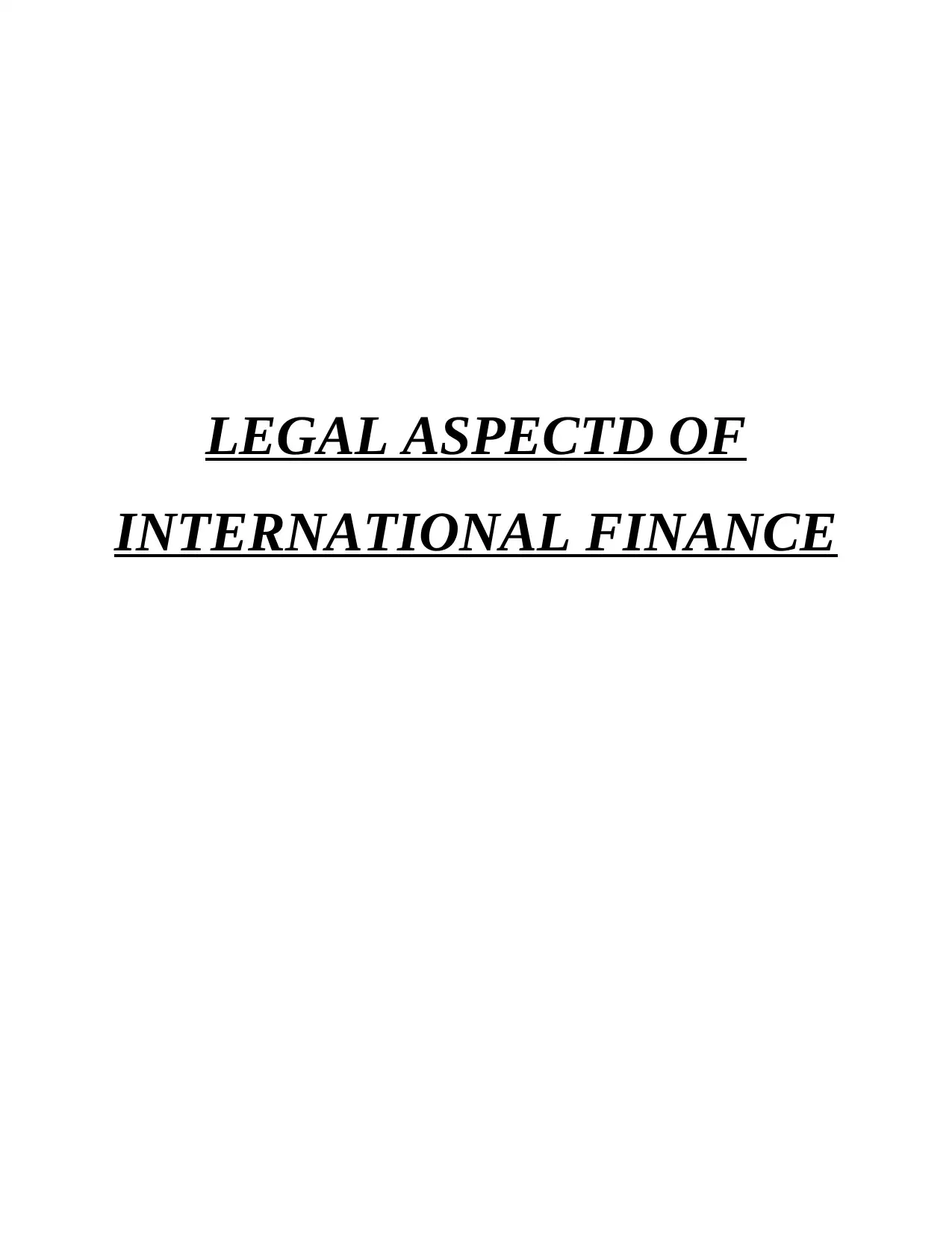
LEGAL ASPECTD OF
INTERNATIONAL FINANCE
INTERNATIONAL FINANCE
Paraphrase This Document
Need a fresh take? Get an instant paraphrase of this document with our AI Paraphraser
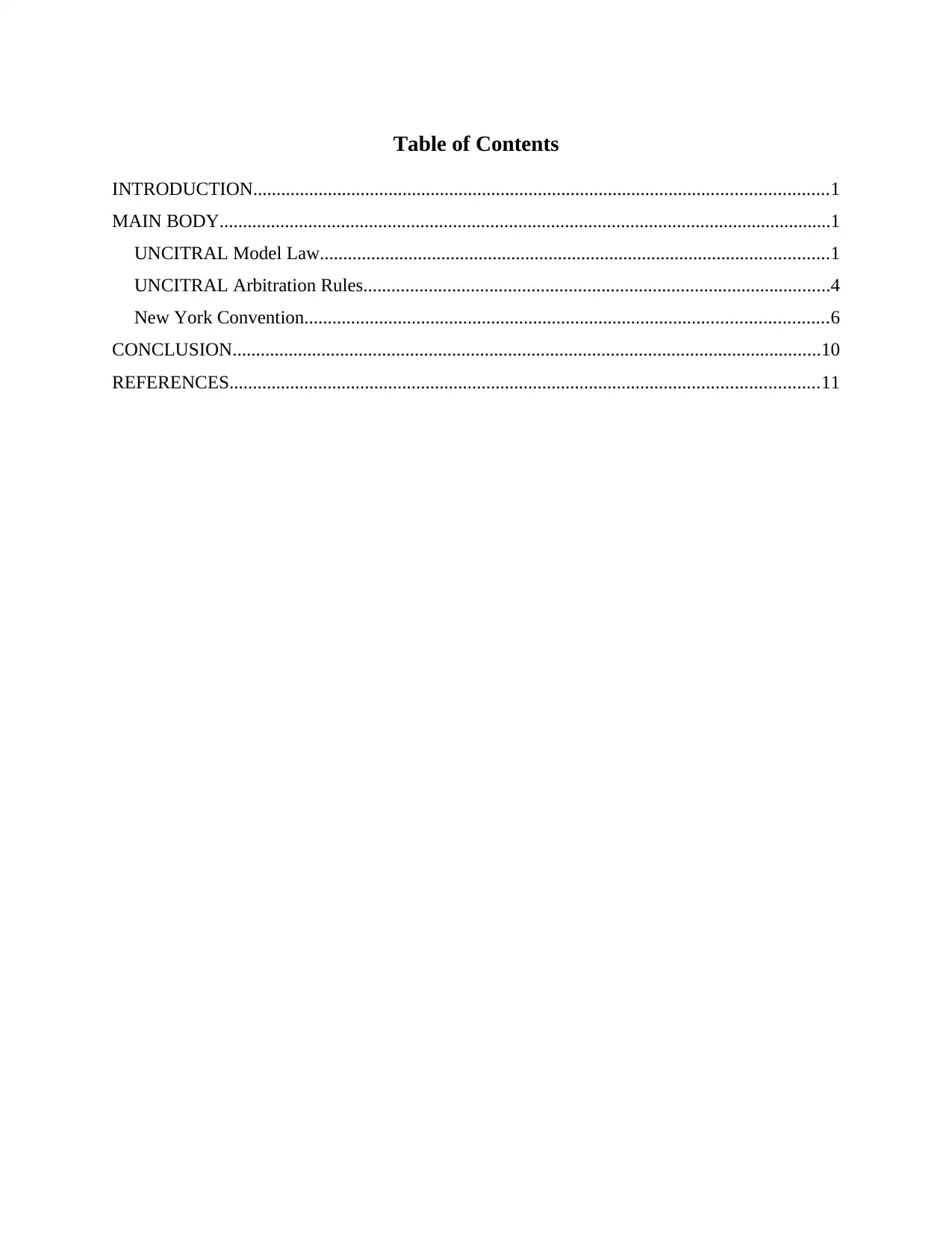
Table of Contents
INTRODUCTION...........................................................................................................................1
MAIN BODY...................................................................................................................................1
UNCITRAL Model Law.............................................................................................................1
UNCITRAL Arbitration Rules....................................................................................................4
New York Convention................................................................................................................6
CONCLUSION..............................................................................................................................10
REFERENCES..............................................................................................................................11
INTRODUCTION...........................................................................................................................1
MAIN BODY...................................................................................................................................1
UNCITRAL Model Law.............................................................................................................1
UNCITRAL Arbitration Rules....................................................................................................4
New York Convention................................................................................................................6
CONCLUSION..............................................................................................................................10
REFERENCES..............................................................................................................................11
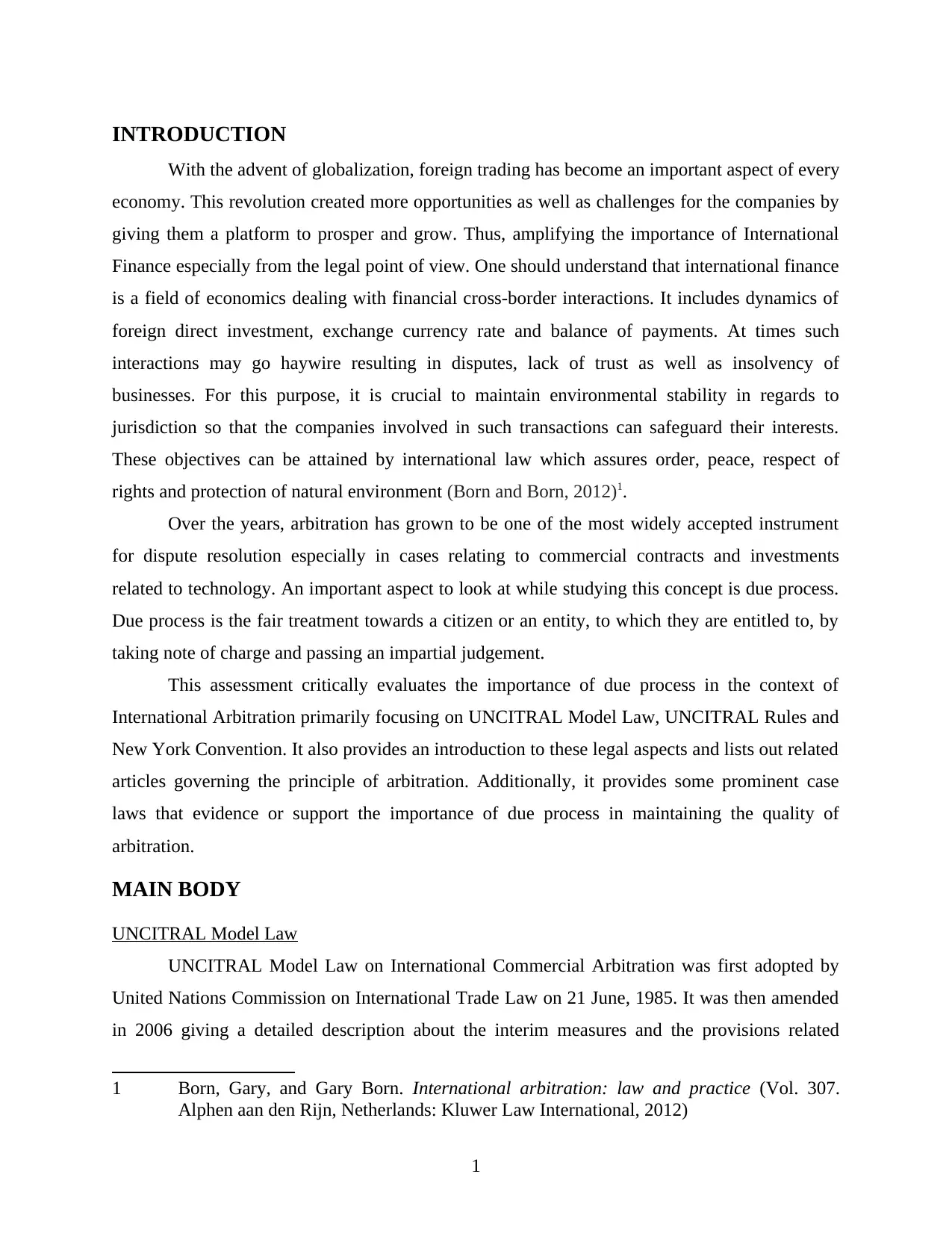
INTRODUCTION
With the advent of globalization, foreign trading has become an important aspect of every
economy. This revolution created more opportunities as well as challenges for the companies by
giving them a platform to prosper and grow. Thus, amplifying the importance of International
Finance especially from the legal point of view. One should understand that international finance
is a field of economics dealing with financial cross-border interactions. It includes dynamics of
foreign direct investment, exchange currency rate and balance of payments. At times such
interactions may go haywire resulting in disputes, lack of trust as well as insolvency of
businesses. For this purpose, it is crucial to maintain environmental stability in regards to
jurisdiction so that the companies involved in such transactions can safeguard their interests.
These objectives can be attained by international law which assures order, peace, respect of
rights and protection of natural environment (Born and Born, 2012)1.
Over the years, arbitration has grown to be one of the most widely accepted instrument
for dispute resolution especially in cases relating to commercial contracts and investments
related to technology. An important aspect to look at while studying this concept is due process.
Due process is the fair treatment towards a citizen or an entity, to which they are entitled to, by
taking note of charge and passing an impartial judgement.
This assessment critically evaluates the importance of due process in the context of
International Arbitration primarily focusing on UNCITRAL Model Law, UNCITRAL Rules and
New York Convention. It also provides an introduction to these legal aspects and lists out related
articles governing the principle of arbitration. Additionally, it provides some prominent case
laws that evidence or support the importance of due process in maintaining the quality of
arbitration.
MAIN BODY
UNCITRAL Model Law
UNCITRAL Model Law on International Commercial Arbitration was first adopted by
United Nations Commission on International Trade Law on 21 June, 1985. It was then amended
in 2006 giving a detailed description about the interim measures and the provisions related
1 Born, Gary, and Gary Born. International arbitration: law and practice (Vol. 307.
Alphen aan den Rijn, Netherlands: Kluwer Law International, 2012)
1
With the advent of globalization, foreign trading has become an important aspect of every
economy. This revolution created more opportunities as well as challenges for the companies by
giving them a platform to prosper and grow. Thus, amplifying the importance of International
Finance especially from the legal point of view. One should understand that international finance
is a field of economics dealing with financial cross-border interactions. It includes dynamics of
foreign direct investment, exchange currency rate and balance of payments. At times such
interactions may go haywire resulting in disputes, lack of trust as well as insolvency of
businesses. For this purpose, it is crucial to maintain environmental stability in regards to
jurisdiction so that the companies involved in such transactions can safeguard their interests.
These objectives can be attained by international law which assures order, peace, respect of
rights and protection of natural environment (Born and Born, 2012)1.
Over the years, arbitration has grown to be one of the most widely accepted instrument
for dispute resolution especially in cases relating to commercial contracts and investments
related to technology. An important aspect to look at while studying this concept is due process.
Due process is the fair treatment towards a citizen or an entity, to which they are entitled to, by
taking note of charge and passing an impartial judgement.
This assessment critically evaluates the importance of due process in the context of
International Arbitration primarily focusing on UNCITRAL Model Law, UNCITRAL Rules and
New York Convention. It also provides an introduction to these legal aspects and lists out related
articles governing the principle of arbitration. Additionally, it provides some prominent case
laws that evidence or support the importance of due process in maintaining the quality of
arbitration.
MAIN BODY
UNCITRAL Model Law
UNCITRAL Model Law on International Commercial Arbitration was first adopted by
United Nations Commission on International Trade Law on 21 June, 1985. It was then amended
in 2006 giving a detailed description about the interim measures and the provisions related
1 Born, Gary, and Gary Born. International arbitration: law and practice (Vol. 307.
Alphen aan den Rijn, Netherlands: Kluwer Law International, 2012)
1
⊘ This is a preview!⊘
Do you want full access?
Subscribe today to unlock all pages.

Trusted by 1+ million students worldwide
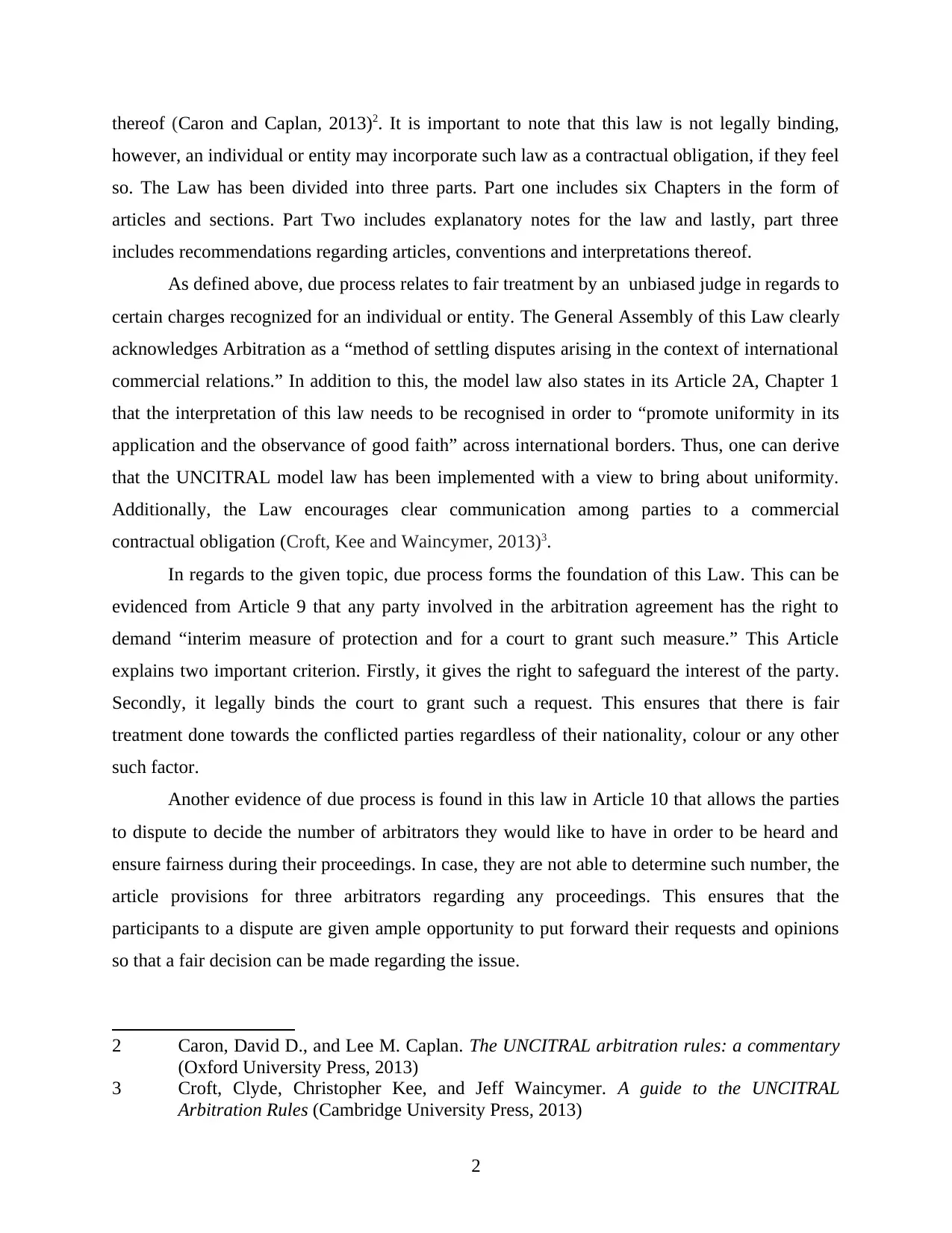
thereof (Caron and Caplan, 2013)2. It is important to note that this law is not legally binding,
however, an individual or entity may incorporate such law as a contractual obligation, if they feel
so. The Law has been divided into three parts. Part one includes six Chapters in the form of
articles and sections. Part Two includes explanatory notes for the law and lastly, part three
includes recommendations regarding articles, conventions and interpretations thereof.
As defined above, due process relates to fair treatment by an unbiased judge in regards to
certain charges recognized for an individual or entity. The General Assembly of this Law clearly
acknowledges Arbitration as a “method of settling disputes arising in the context of international
commercial relations.” In addition to this, the model law also states in its Article 2A, Chapter 1
that the interpretation of this law needs to be recognised in order to “promote uniformity in its
application and the observance of good faith” across international borders. Thus, one can derive
that the UNCITRAL model law has been implemented with a view to bring about uniformity.
Additionally, the Law encourages clear communication among parties to a commercial
contractual obligation (Croft, Kee and Waincymer, 2013)3.
In regards to the given topic, due process forms the foundation of this Law. This can be
evidenced from Article 9 that any party involved in the arbitration agreement has the right to
demand “interim measure of protection and for a court to grant such measure.” This Article
explains two important criterion. Firstly, it gives the right to safeguard the interest of the party.
Secondly, it legally binds the court to grant such a request. This ensures that there is fair
treatment done towards the conflicted parties regardless of their nationality, colour or any other
such factor.
Another evidence of due process is found in this law in Article 10 that allows the parties
to dispute to decide the number of arbitrators they would like to have in order to be heard and
ensure fairness during their proceedings. In case, they are not able to determine such number, the
article provisions for three arbitrators regarding any proceedings. This ensures that the
participants to a dispute are given ample opportunity to put forward their requests and opinions
so that a fair decision can be made regarding the issue.
2 Caron, David D., and Lee M. Caplan. The UNCITRAL arbitration rules: a commentary
(Oxford University Press, 2013)
3 Croft, Clyde, Christopher Kee, and Jeff Waincymer. A guide to the UNCITRAL
Arbitration Rules (Cambridge University Press, 2013)
2
however, an individual or entity may incorporate such law as a contractual obligation, if they feel
so. The Law has been divided into three parts. Part one includes six Chapters in the form of
articles and sections. Part Two includes explanatory notes for the law and lastly, part three
includes recommendations regarding articles, conventions and interpretations thereof.
As defined above, due process relates to fair treatment by an unbiased judge in regards to
certain charges recognized for an individual or entity. The General Assembly of this Law clearly
acknowledges Arbitration as a “method of settling disputes arising in the context of international
commercial relations.” In addition to this, the model law also states in its Article 2A, Chapter 1
that the interpretation of this law needs to be recognised in order to “promote uniformity in its
application and the observance of good faith” across international borders. Thus, one can derive
that the UNCITRAL model law has been implemented with a view to bring about uniformity.
Additionally, the Law encourages clear communication among parties to a commercial
contractual obligation (Croft, Kee and Waincymer, 2013)3.
In regards to the given topic, due process forms the foundation of this Law. This can be
evidenced from Article 9 that any party involved in the arbitration agreement has the right to
demand “interim measure of protection and for a court to grant such measure.” This Article
explains two important criterion. Firstly, it gives the right to safeguard the interest of the party.
Secondly, it legally binds the court to grant such a request. This ensures that there is fair
treatment done towards the conflicted parties regardless of their nationality, colour or any other
such factor.
Another evidence of due process is found in this law in Article 10 that allows the parties
to dispute to decide the number of arbitrators they would like to have in order to be heard and
ensure fairness during their proceedings. In case, they are not able to determine such number, the
article provisions for three arbitrators regarding any proceedings. This ensures that the
participants to a dispute are given ample opportunity to put forward their requests and opinions
so that a fair decision can be made regarding the issue.
2 Caron, David D., and Lee M. Caplan. The UNCITRAL arbitration rules: a commentary
(Oxford University Press, 2013)
3 Croft, Clyde, Christopher Kee, and Jeff Waincymer. A guide to the UNCITRAL
Arbitration Rules (Cambridge University Press, 2013)
2
Paraphrase This Document
Need a fresh take? Get an instant paraphrase of this document with our AI Paraphraser
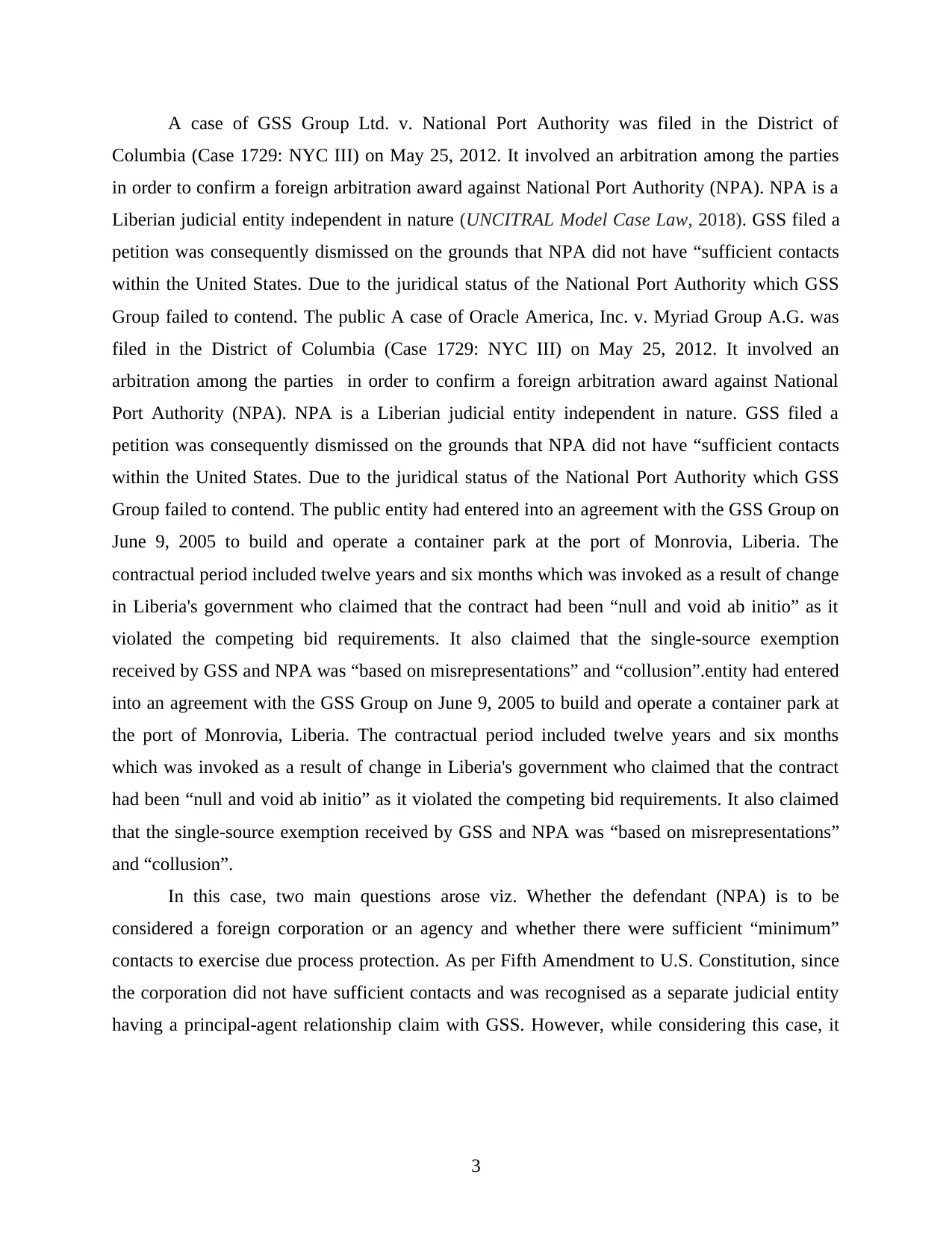
A case of GSS Group Ltd. v. National Port Authority was filed in the District of
Columbia (Case 1729: NYC III) on May 25, 2012. It involved an arbitration among the parties
in order to confirm a foreign arbitration award against National Port Authority (NPA). NPA is a
Liberian judicial entity independent in nature (UNCITRAL Model Case Law, 2018). GSS filed a
petition was consequently dismissed on the grounds that NPA did not have “sufficient contacts
within the United States. Due to the juridical status of the National Port Authority which GSS
Group failed to contend. The public A case of Oracle America, Inc. v. Myriad Group A.G. was
filed in the District of Columbia (Case 1729: NYC III) on May 25, 2012. It involved an
arbitration among the parties in order to confirm a foreign arbitration award against National
Port Authority (NPA). NPA is a Liberian judicial entity independent in nature. GSS filed a
petition was consequently dismissed on the grounds that NPA did not have “sufficient contacts
within the United States. Due to the juridical status of the National Port Authority which GSS
Group failed to contend. The public entity had entered into an agreement with the GSS Group on
June 9, 2005 to build and operate a container park at the port of Monrovia, Liberia. The
contractual period included twelve years and six months which was invoked as a result of change
in Liberia's government who claimed that the contract had been “null and void ab initio” as it
violated the competing bid requirements. It also claimed that the single-source exemption
received by GSS and NPA was “based on misrepresentations” and “collusion”.entity had entered
into an agreement with the GSS Group on June 9, 2005 to build and operate a container park at
the port of Monrovia, Liberia. The contractual period included twelve years and six months
which was invoked as a result of change in Liberia's government who claimed that the contract
had been “null and void ab initio” as it violated the competing bid requirements. It also claimed
that the single-source exemption received by GSS and NPA was “based on misrepresentations”
and “collusion”.
In this case, two main questions arose viz. Whether the defendant (NPA) is to be
considered a foreign corporation or an agency and whether there were sufficient “minimum”
contacts to exercise due process protection. As per Fifth Amendment to U.S. Constitution, since
the corporation did not have sufficient contacts and was recognised as a separate judicial entity
having a principal-agent relationship claim with GSS. However, while considering this case, it
3
Columbia (Case 1729: NYC III) on May 25, 2012. It involved an arbitration among the parties
in order to confirm a foreign arbitration award against National Port Authority (NPA). NPA is a
Liberian judicial entity independent in nature (UNCITRAL Model Case Law, 2018). GSS filed a
petition was consequently dismissed on the grounds that NPA did not have “sufficient contacts
within the United States. Due to the juridical status of the National Port Authority which GSS
Group failed to contend. The public A case of Oracle America, Inc. v. Myriad Group A.G. was
filed in the District of Columbia (Case 1729: NYC III) on May 25, 2012. It involved an
arbitration among the parties in order to confirm a foreign arbitration award against National
Port Authority (NPA). NPA is a Liberian judicial entity independent in nature. GSS filed a
petition was consequently dismissed on the grounds that NPA did not have “sufficient contacts
within the United States. Due to the juridical status of the National Port Authority which GSS
Group failed to contend. The public entity had entered into an agreement with the GSS Group on
June 9, 2005 to build and operate a container park at the port of Monrovia, Liberia. The
contractual period included twelve years and six months which was invoked as a result of change
in Liberia's government who claimed that the contract had been “null and void ab initio” as it
violated the competing bid requirements. It also claimed that the single-source exemption
received by GSS and NPA was “based on misrepresentations” and “collusion”.entity had entered
into an agreement with the GSS Group on June 9, 2005 to build and operate a container park at
the port of Monrovia, Liberia. The contractual period included twelve years and six months
which was invoked as a result of change in Liberia's government who claimed that the contract
had been “null and void ab initio” as it violated the competing bid requirements. It also claimed
that the single-source exemption received by GSS and NPA was “based on misrepresentations”
and “collusion”.
In this case, two main questions arose viz. Whether the defendant (NPA) is to be
considered a foreign corporation or an agency and whether there were sufficient “minimum”
contacts to exercise due process protection. As per Fifth Amendment to U.S. Constitution, since
the corporation did not have sufficient contacts and was recognised as a separate judicial entity
having a principal-agent relationship claim with GSS. However, while considering this case, it
3
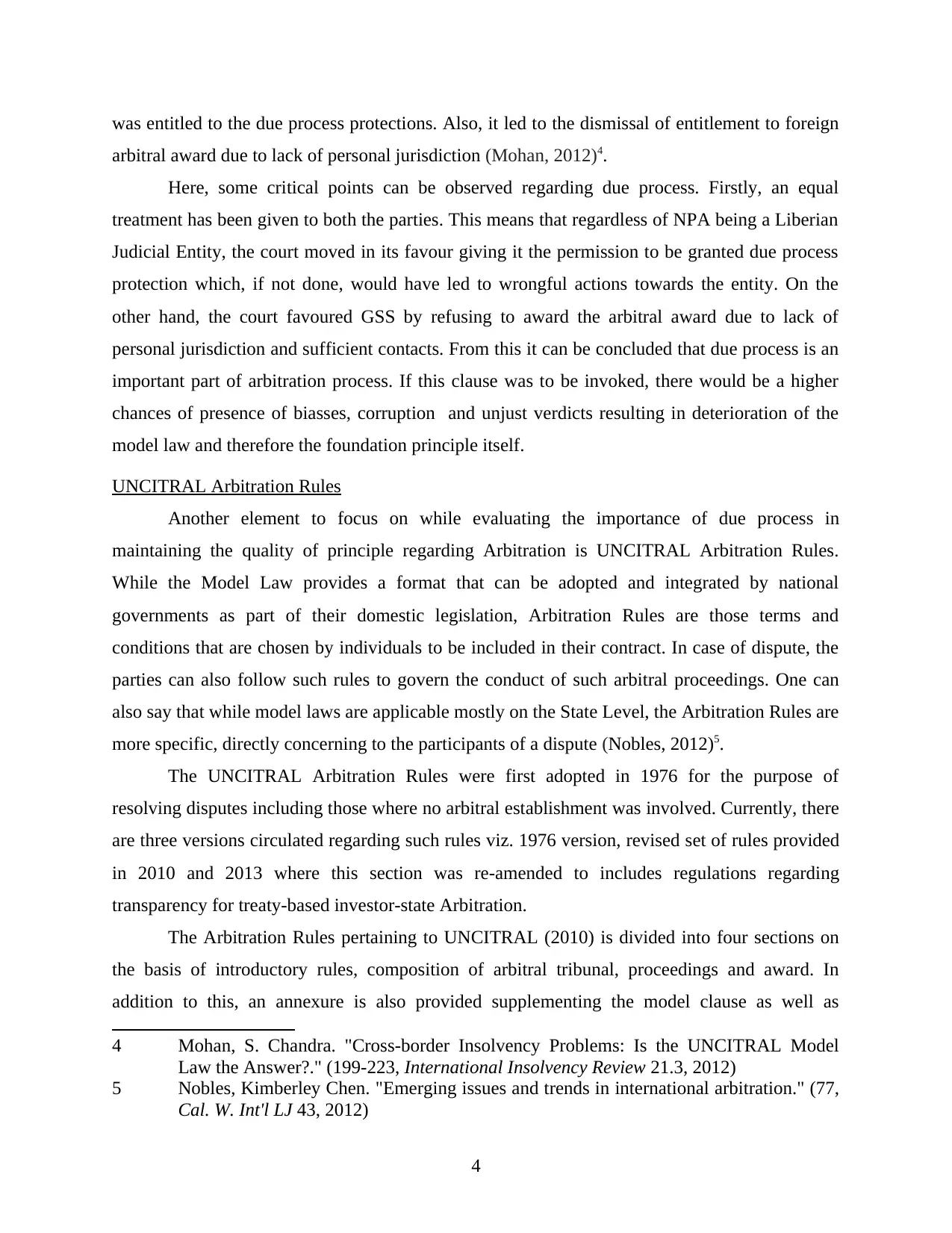
was entitled to the due process protections. Also, it led to the dismissal of entitlement to foreign
arbitral award due to lack of personal jurisdiction (Mohan, 2012)4.
Here, some critical points can be observed regarding due process. Firstly, an equal
treatment has been given to both the parties. This means that regardless of NPA being a Liberian
Judicial Entity, the court moved in its favour giving it the permission to be granted due process
protection which, if not done, would have led to wrongful actions towards the entity. On the
other hand, the court favoured GSS by refusing to award the arbitral award due to lack of
personal jurisdiction and sufficient contacts. From this it can be concluded that due process is an
important part of arbitration process. If this clause was to be invoked, there would be a higher
chances of presence of biasses, corruption and unjust verdicts resulting in deterioration of the
model law and therefore the foundation principle itself.
UNCITRAL Arbitration Rules
Another element to focus on while evaluating the importance of due process in
maintaining the quality of principle regarding Arbitration is UNCITRAL Arbitration Rules.
While the Model Law provides a format that can be adopted and integrated by national
governments as part of their domestic legislation, Arbitration Rules are those terms and
conditions that are chosen by individuals to be included in their contract. In case of dispute, the
parties can also follow such rules to govern the conduct of such arbitral proceedings. One can
also say that while model laws are applicable mostly on the State Level, the Arbitration Rules are
more specific, directly concerning to the participants of a dispute (Nobles, 2012)5.
The UNCITRAL Arbitration Rules were first adopted in 1976 for the purpose of
resolving disputes including those where no arbitral establishment was involved. Currently, there
are three versions circulated regarding such rules viz. 1976 version, revised set of rules provided
in 2010 and 2013 where this section was re-amended to includes regulations regarding
transparency for treaty-based investor-state Arbitration.
The Arbitration Rules pertaining to UNCITRAL (2010) is divided into four sections on
the basis of introductory rules, composition of arbitral tribunal, proceedings and award. In
addition to this, an annexure is also provided supplementing the model clause as well as
4 Mohan, S. Chandra. "Cross‐border Insolvency Problems: Is the UNCITRAL Model
Law the Answer?." (199-223, International Insolvency Review 21.3, 2012)
5 Nobles, Kimberley Chen. "Emerging issues and trends in international arbitration." (77,
Cal. W. Int'l LJ 43, 2012)
4
arbitral award due to lack of personal jurisdiction (Mohan, 2012)4.
Here, some critical points can be observed regarding due process. Firstly, an equal
treatment has been given to both the parties. This means that regardless of NPA being a Liberian
Judicial Entity, the court moved in its favour giving it the permission to be granted due process
protection which, if not done, would have led to wrongful actions towards the entity. On the
other hand, the court favoured GSS by refusing to award the arbitral award due to lack of
personal jurisdiction and sufficient contacts. From this it can be concluded that due process is an
important part of arbitration process. If this clause was to be invoked, there would be a higher
chances of presence of biasses, corruption and unjust verdicts resulting in deterioration of the
model law and therefore the foundation principle itself.
UNCITRAL Arbitration Rules
Another element to focus on while evaluating the importance of due process in
maintaining the quality of principle regarding Arbitration is UNCITRAL Arbitration Rules.
While the Model Law provides a format that can be adopted and integrated by national
governments as part of their domestic legislation, Arbitration Rules are those terms and
conditions that are chosen by individuals to be included in their contract. In case of dispute, the
parties can also follow such rules to govern the conduct of such arbitral proceedings. One can
also say that while model laws are applicable mostly on the State Level, the Arbitration Rules are
more specific, directly concerning to the participants of a dispute (Nobles, 2012)5.
The UNCITRAL Arbitration Rules were first adopted in 1976 for the purpose of
resolving disputes including those where no arbitral establishment was involved. Currently, there
are three versions circulated regarding such rules viz. 1976 version, revised set of rules provided
in 2010 and 2013 where this section was re-amended to includes regulations regarding
transparency for treaty-based investor-state Arbitration.
The Arbitration Rules pertaining to UNCITRAL (2010) is divided into four sections on
the basis of introductory rules, composition of arbitral tribunal, proceedings and award. In
addition to this, an annexure is also provided supplementing the model clause as well as
4 Mohan, S. Chandra. "Cross‐border Insolvency Problems: Is the UNCITRAL Model
Law the Answer?." (199-223, International Insolvency Review 21.3, 2012)
5 Nobles, Kimberley Chen. "Emerging issues and trends in international arbitration." (77,
Cal. W. Int'l LJ 43, 2012)
4
⊘ This is a preview!⊘
Do you want full access?
Subscribe today to unlock all pages.

Trusted by 1+ million students worldwide
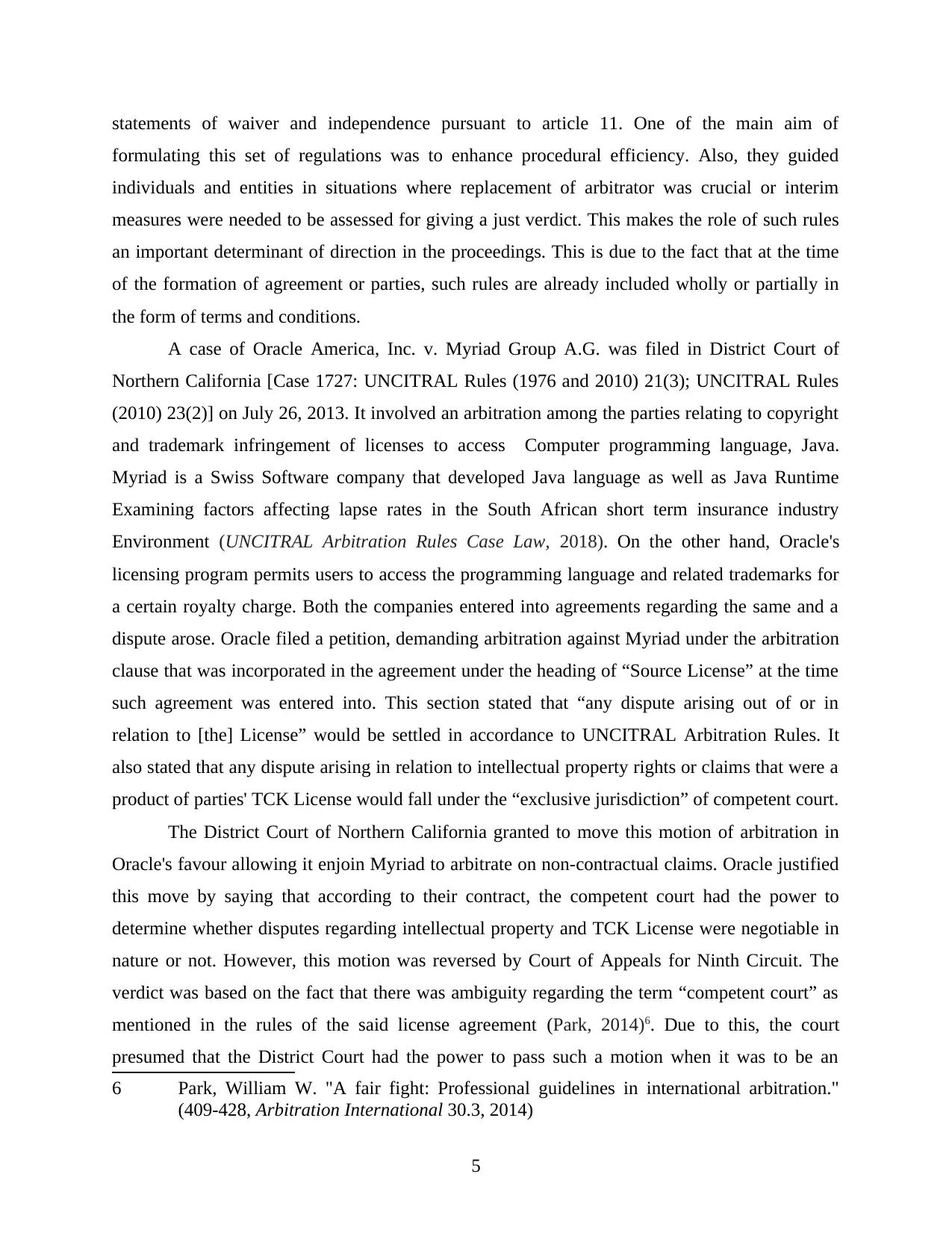
statements of waiver and independence pursuant to article 11. One of the main aim of
formulating this set of regulations was to enhance procedural efficiency. Also, they guided
individuals and entities in situations where replacement of arbitrator was crucial or interim
measures were needed to be assessed for giving a just verdict. This makes the role of such rules
an important determinant of direction in the proceedings. This is due to the fact that at the time
of the formation of agreement or parties, such rules are already included wholly or partially in
the form of terms and conditions.
A case of Oracle America, Inc. v. Myriad Group A.G. was filed in District Court of
Northern California [Case 1727: UNCITRAL Rules (1976 and 2010) 21(3); UNCITRAL Rules
(2010) 23(2)] on July 26, 2013. It involved an arbitration among the parties relating to copyright
and trademark infringement of licenses to access Computer programming language, Java.
Myriad is a Swiss Software company that developed Java language as well as Java Runtime
Examining factors affecting lapse rates in the South African short term insurance industry
Environment (UNCITRAL Arbitration Rules Case Law, 2018). On the other hand, Oracle's
licensing program permits users to access the programming language and related trademarks for
a certain royalty charge. Both the companies entered into agreements regarding the same and a
dispute arose. Oracle filed a petition, demanding arbitration against Myriad under the arbitration
clause that was incorporated in the agreement under the heading of “Source License” at the time
such agreement was entered into. This section stated that “any dispute arising out of or in
relation to [the] License” would be settled in accordance to UNCITRAL Arbitration Rules. It
also stated that any dispute arising in relation to intellectual property rights or claims that were a
product of parties' TCK License would fall under the “exclusive jurisdiction” of competent court.
The District Court of Northern California granted to move this motion of arbitration in
Oracle's favour allowing it enjoin Myriad to arbitrate on non-contractual claims. Oracle justified
this move by saying that according to their contract, the competent court had the power to
determine whether disputes regarding intellectual property and TCK License were negotiable in
nature or not. However, this motion was reversed by Court of Appeals for Ninth Circuit. The
verdict was based on the fact that there was ambiguity regarding the term “competent court” as
mentioned in the rules of the said license agreement (Park, 2014)6. Due to this, the court
presumed that the District Court had the power to pass such a motion when it was to be an
6 Park, William W. "A fair fight: Professional guidelines in international arbitration."
(409-428, Arbitration International 30.3, 2014)
5
formulating this set of regulations was to enhance procedural efficiency. Also, they guided
individuals and entities in situations where replacement of arbitrator was crucial or interim
measures were needed to be assessed for giving a just verdict. This makes the role of such rules
an important determinant of direction in the proceedings. This is due to the fact that at the time
of the formation of agreement or parties, such rules are already included wholly or partially in
the form of terms and conditions.
A case of Oracle America, Inc. v. Myriad Group A.G. was filed in District Court of
Northern California [Case 1727: UNCITRAL Rules (1976 and 2010) 21(3); UNCITRAL Rules
(2010) 23(2)] on July 26, 2013. It involved an arbitration among the parties relating to copyright
and trademark infringement of licenses to access Computer programming language, Java.
Myriad is a Swiss Software company that developed Java language as well as Java Runtime
Examining factors affecting lapse rates in the South African short term insurance industry
Environment (UNCITRAL Arbitration Rules Case Law, 2018). On the other hand, Oracle's
licensing program permits users to access the programming language and related trademarks for
a certain royalty charge. Both the companies entered into agreements regarding the same and a
dispute arose. Oracle filed a petition, demanding arbitration against Myriad under the arbitration
clause that was incorporated in the agreement under the heading of “Source License” at the time
such agreement was entered into. This section stated that “any dispute arising out of or in
relation to [the] License” would be settled in accordance to UNCITRAL Arbitration Rules. It
also stated that any dispute arising in relation to intellectual property rights or claims that were a
product of parties' TCK License would fall under the “exclusive jurisdiction” of competent court.
The District Court of Northern California granted to move this motion of arbitration in
Oracle's favour allowing it enjoin Myriad to arbitrate on non-contractual claims. Oracle justified
this move by saying that according to their contract, the competent court had the power to
determine whether disputes regarding intellectual property and TCK License were negotiable in
nature or not. However, this motion was reversed by Court of Appeals for Ninth Circuit. The
verdict was based on the fact that there was ambiguity regarding the term “competent court” as
mentioned in the rules of the said license agreement (Park, 2014)6. Due to this, the court
presumed that the District Court had the power to pass such a motion when it was to be an
6 Park, William W. "A fair fight: Professional guidelines in international arbitration."
(409-428, Arbitration International 30.3, 2014)
5
Paraphrase This Document
Need a fresh take? Get an instant paraphrase of this document with our AI Paraphraser
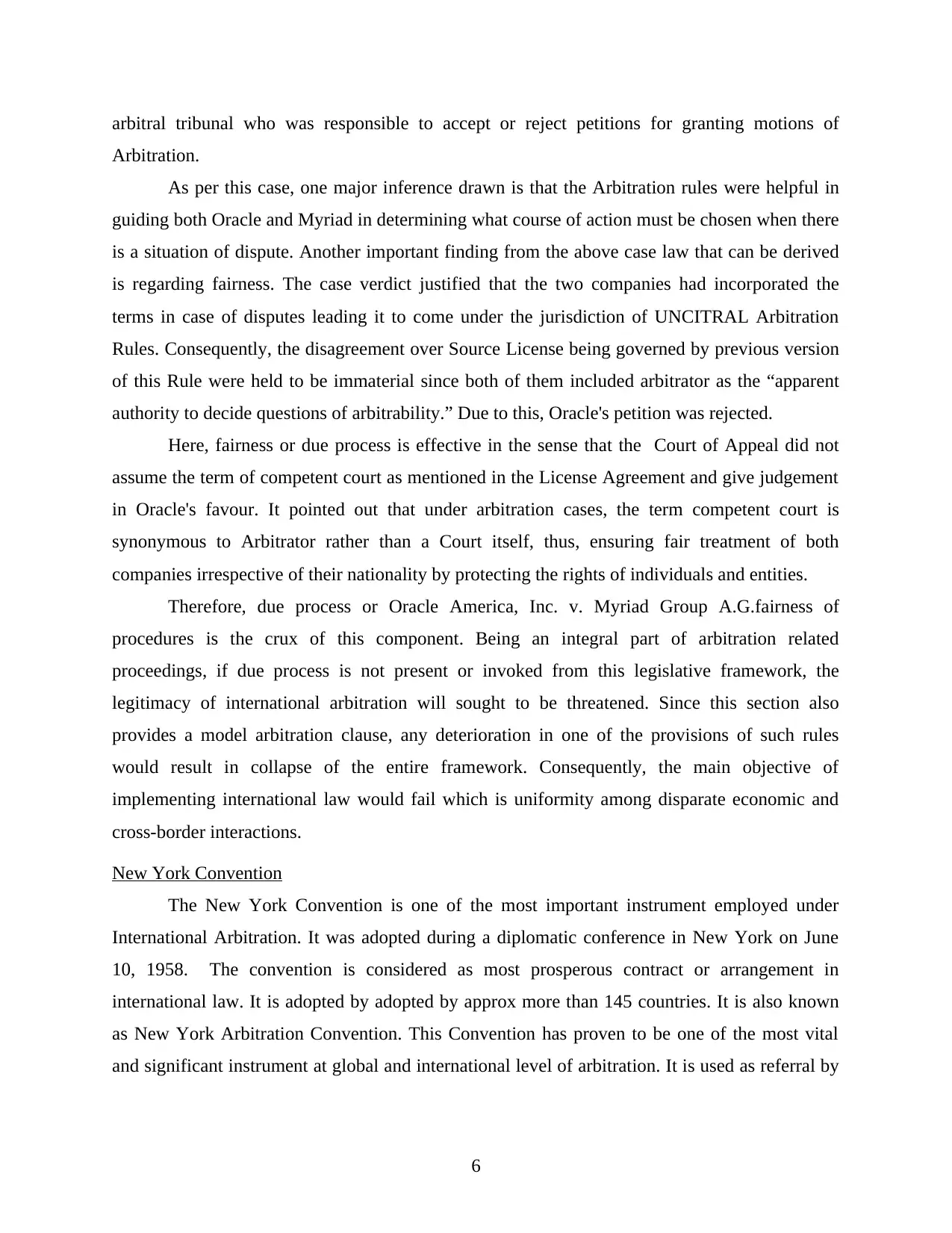
arbitral tribunal who was responsible to accept or reject petitions for granting motions of
Arbitration.
As per this case, one major inference drawn is that the Arbitration rules were helpful in
guiding both Oracle and Myriad in determining what course of action must be chosen when there
is a situation of dispute. Another important finding from the above case law that can be derived
is regarding fairness. The case verdict justified that the two companies had incorporated the
terms in case of disputes leading it to come under the jurisdiction of UNCITRAL Arbitration
Rules. Consequently, the disagreement over Source License being governed by previous version
of this Rule were held to be immaterial since both of them included arbitrator as the “apparent
authority to decide questions of arbitrability.” Due to this, Oracle's petition was rejected.
Here, fairness or due process is effective in the sense that the Court of Appeal did not
assume the term of competent court as mentioned in the License Agreement and give judgement
in Oracle's favour. It pointed out that under arbitration cases, the term competent court is
synonymous to Arbitrator rather than a Court itself, thus, ensuring fair treatment of both
companies irrespective of their nationality by protecting the rights of individuals and entities.
Therefore, due process or Oracle America, Inc. v. Myriad Group A.G.fairness of
procedures is the crux of this component. Being an integral part of arbitration related
proceedings, if due process is not present or invoked from this legislative framework, the
legitimacy of international arbitration will sought to be threatened. Since this section also
provides a model arbitration clause, any deterioration in one of the provisions of such rules
would result in collapse of the entire framework. Consequently, the main objective of
implementing international law would fail which is uniformity among disparate economic and
cross-border interactions.
New York Convention
The New York Convention is one of the most important instrument employed under
International Arbitration. It was adopted during a diplomatic conference in New York on June
10, 1958. The convention is considered as most prosperous contract or arrangement in
international law. It is adopted by adopted by approx more than 145 countries. It is also known
as New York Arbitration Convention. This Convention has proven to be one of the most vital
and significant instrument at global and international level of arbitration. It is used as referral by
6
Arbitration.
As per this case, one major inference drawn is that the Arbitration rules were helpful in
guiding both Oracle and Myriad in determining what course of action must be chosen when there
is a situation of dispute. Another important finding from the above case law that can be derived
is regarding fairness. The case verdict justified that the two companies had incorporated the
terms in case of disputes leading it to come under the jurisdiction of UNCITRAL Arbitration
Rules. Consequently, the disagreement over Source License being governed by previous version
of this Rule were held to be immaterial since both of them included arbitrator as the “apparent
authority to decide questions of arbitrability.” Due to this, Oracle's petition was rejected.
Here, fairness or due process is effective in the sense that the Court of Appeal did not
assume the term of competent court as mentioned in the License Agreement and give judgement
in Oracle's favour. It pointed out that under arbitration cases, the term competent court is
synonymous to Arbitrator rather than a Court itself, thus, ensuring fair treatment of both
companies irrespective of their nationality by protecting the rights of individuals and entities.
Therefore, due process or Oracle America, Inc. v. Myriad Group A.G.fairness of
procedures is the crux of this component. Being an integral part of arbitration related
proceedings, if due process is not present or invoked from this legislative framework, the
legitimacy of international arbitration will sought to be threatened. Since this section also
provides a model arbitration clause, any deterioration in one of the provisions of such rules
would result in collapse of the entire framework. Consequently, the main objective of
implementing international law would fail which is uniformity among disparate economic and
cross-border interactions.
New York Convention
The New York Convention is one of the most important instrument employed under
International Arbitration. It was adopted during a diplomatic conference in New York on June
10, 1958. The convention is considered as most prosperous contract or arrangement in
international law. It is adopted by adopted by approx more than 145 countries. It is also known
as New York Arbitration Convention. This Convention has proven to be one of the most vital
and significant instrument at global and international level of arbitration. It is used as referral by
6
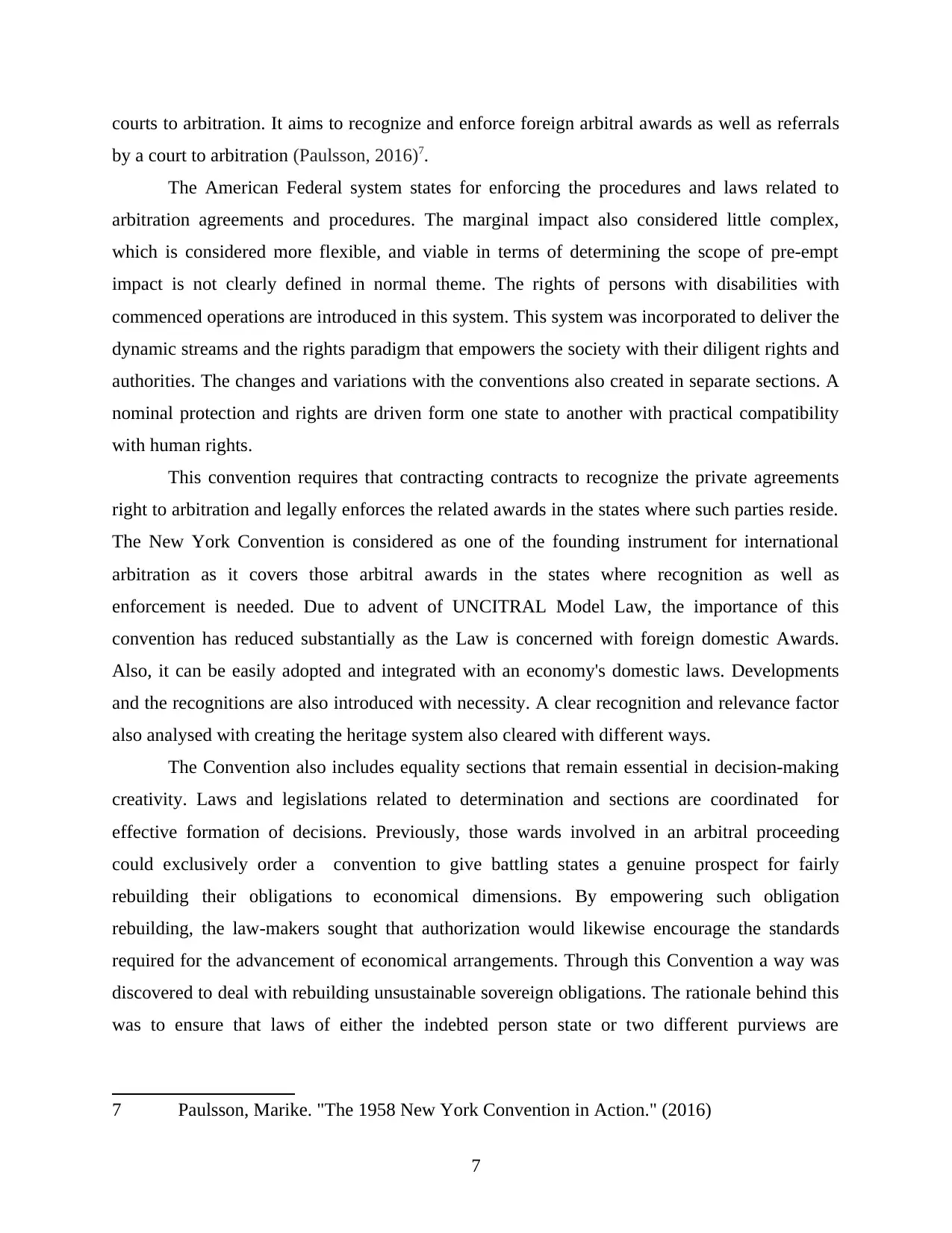
courts to arbitration. It aims to recognize and enforce foreign arbitral awards as well as referrals
by a court to arbitration (Paulsson, 2016)7.
The American Federal system states for enforcing the procedures and laws related to
arbitration agreements and procedures. The marginal impact also considered little complex,
which is considered more flexible, and viable in terms of determining the scope of pre-empt
impact is not clearly defined in normal theme. The rights of persons with disabilities with
commenced operations are introduced in this system. This system was incorporated to deliver the
dynamic streams and the rights paradigm that empowers the society with their diligent rights and
authorities. The changes and variations with the conventions also created in separate sections. A
nominal protection and rights are driven form one state to another with practical compatibility
with human rights.
This convention requires that contracting contracts to recognize the private agreements
right to arbitration and legally enforces the related awards in the states where such parties reside.
The New York Convention is considered as one of the founding instrument for international
arbitration as it covers those arbitral awards in the states where recognition as well as
enforcement is needed. Due to advent of UNCITRAL Model Law, the importance of this
convention has reduced substantially as the Law is concerned with foreign domestic Awards.
Also, it can be easily adopted and integrated with an economy's domestic laws. Developments
and the recognitions are also introduced with necessity. A clear recognition and relevance factor
also analysed with creating the heritage system also cleared with different ways.
The Convention also includes equality sections that remain essential in decision-making
creativity. Laws and legislations related to determination and sections are coordinated for
effective formation of decisions. Previously, those wards involved in an arbitral proceeding
could exclusively order a convention to give battling states a genuine prospect for fairly
rebuilding their obligations to economical dimensions. By empowering such obligation
rebuilding, the law-makers sought that authorization would likewise encourage the standards
required for the advancement of economical arrangements. Through this Convention a way was
discovered to deal with rebuilding unsustainable sovereign obligations. The rationale behind this
was to ensure that laws of either the indebted person state or two different purviews are
7 Paulsson, Marike. "The 1958 New York Convention in Action." (2016)
7
by a court to arbitration (Paulsson, 2016)7.
The American Federal system states for enforcing the procedures and laws related to
arbitration agreements and procedures. The marginal impact also considered little complex,
which is considered more flexible, and viable in terms of determining the scope of pre-empt
impact is not clearly defined in normal theme. The rights of persons with disabilities with
commenced operations are introduced in this system. This system was incorporated to deliver the
dynamic streams and the rights paradigm that empowers the society with their diligent rights and
authorities. The changes and variations with the conventions also created in separate sections. A
nominal protection and rights are driven form one state to another with practical compatibility
with human rights.
This convention requires that contracting contracts to recognize the private agreements
right to arbitration and legally enforces the related awards in the states where such parties reside.
The New York Convention is considered as one of the founding instrument for international
arbitration as it covers those arbitral awards in the states where recognition as well as
enforcement is needed. Due to advent of UNCITRAL Model Law, the importance of this
convention has reduced substantially as the Law is concerned with foreign domestic Awards.
Also, it can be easily adopted and integrated with an economy's domestic laws. Developments
and the recognitions are also introduced with necessity. A clear recognition and relevance factor
also analysed with creating the heritage system also cleared with different ways.
The Convention also includes equality sections that remain essential in decision-making
creativity. Laws and legislations related to determination and sections are coordinated for
effective formation of decisions. Previously, those wards involved in an arbitral proceeding
could exclusively order a convention to give battling states a genuine prospect for fairly
rebuilding their obligations to economical dimensions. By empowering such obligation
rebuilding, the law-makers sought that authorization would likewise encourage the standards
required for the advancement of economical arrangements. Through this Convention a way was
discovered to deal with rebuilding unsustainable sovereign obligations. The rationale behind this
was to ensure that laws of either the indebted person state or two different purviews are
7 Paulsson, Marike. "The 1958 New York Convention in Action." (2016)
7
⊘ This is a preview!⊘
Do you want full access?
Subscribe today to unlock all pages.

Trusted by 1+ million students worldwide
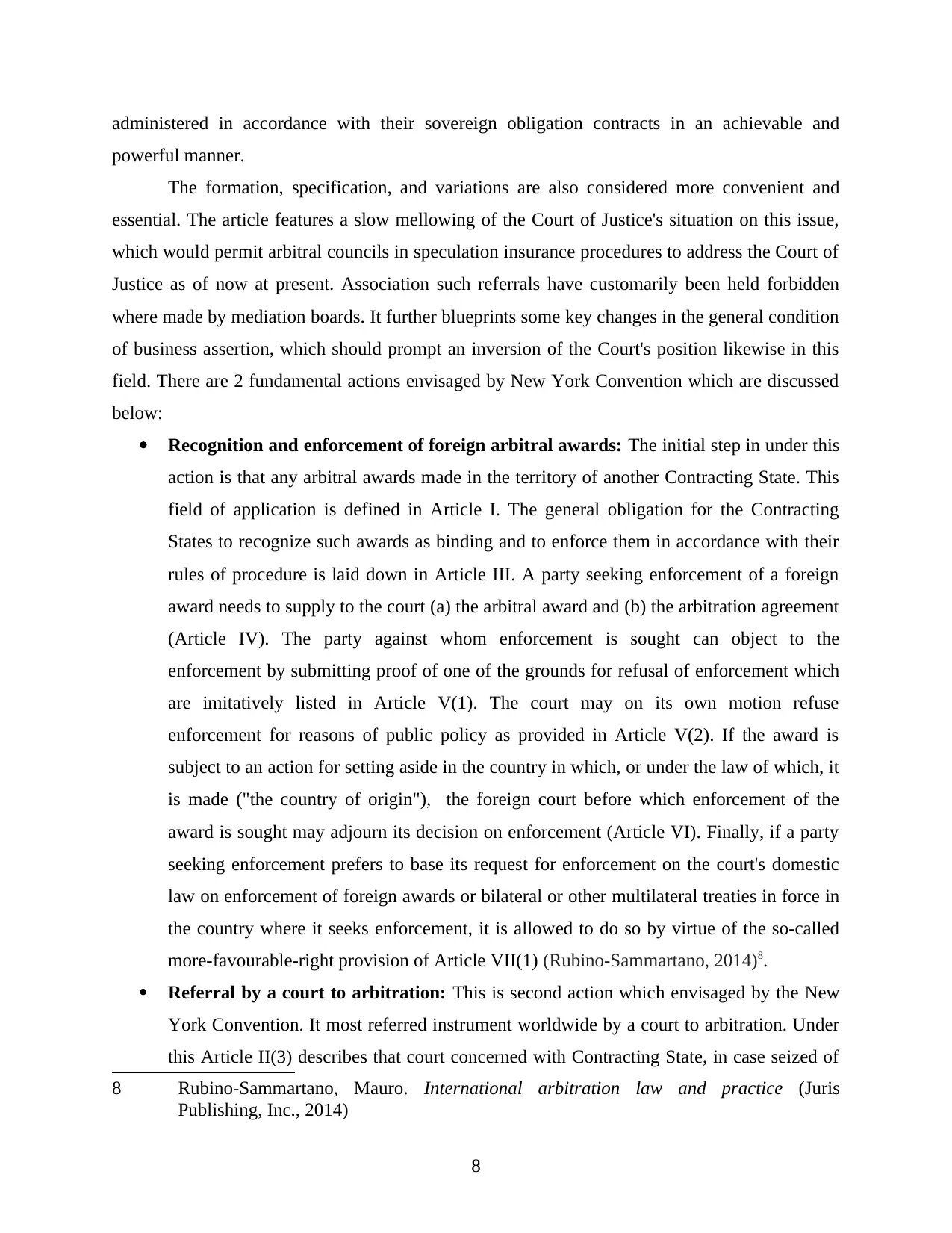
administered in accordance with their sovereign obligation contracts in an achievable and
powerful manner.
The formation, specification, and variations are also considered more convenient and
essential. The article features a slow mellowing of the Court of Justice's situation on this issue,
which would permit arbitral councils in speculation insurance procedures to address the Court of
Justice as of now at present. Association such referrals have customarily been held forbidden
where made by mediation boards. It further blueprints some key changes in the general condition
of business assertion, which should prompt an inversion of the Court's position likewise in this
field. There are 2 fundamental actions envisaged by New York Convention which are discussed
below:
Recognition and enforcement of foreign arbitral awards: The initial step in under this
action is that any arbitral awards made in the territory of another Contracting State. This
field of application is defined in Article I. The general obligation for the Contracting
States to recognize such awards as binding and to enforce them in accordance with their
rules of procedure is laid down in Article III. A party seeking enforcement of a foreign
award needs to supply to the court (a) the arbitral award and (b) the arbitration agreement
(Article IV). The party against whom enforcement is sought can object to the
enforcement by submitting proof of one of the grounds for refusal of enforcement which
are imitatively listed in Article V(1). The court may on its own motion refuse
enforcement for reasons of public policy as provided in Article V(2). If the award is
subject to an action for setting aside in the country in which, or under the law of which, it
is made ("the country of origin"), the foreign court before which enforcement of the
award is sought may adjourn its decision on enforcement (Article VI). Finally, if a party
seeking enforcement prefers to base its request for enforcement on the court's domestic
law on enforcement of foreign awards or bilateral or other multilateral treaties in force in
the country where it seeks enforcement, it is allowed to do so by virtue of the so-called
more-favourable-right provision of Article VII(1) (Rubino-Sammartano, 2014)8.
Referral by a court to arbitration: This is second action which envisaged by the New
York Convention. It most referred instrument worldwide by a court to arbitration. Under
this Article II(3) describes that court concerned with Contracting State, in case seized of
8 Rubino-Sammartano, Mauro. International arbitration law and practice (Juris
Publishing, Inc., 2014)
8
powerful manner.
The formation, specification, and variations are also considered more convenient and
essential. The article features a slow mellowing of the Court of Justice's situation on this issue,
which would permit arbitral councils in speculation insurance procedures to address the Court of
Justice as of now at present. Association such referrals have customarily been held forbidden
where made by mediation boards. It further blueprints some key changes in the general condition
of business assertion, which should prompt an inversion of the Court's position likewise in this
field. There are 2 fundamental actions envisaged by New York Convention which are discussed
below:
Recognition and enforcement of foreign arbitral awards: The initial step in under this
action is that any arbitral awards made in the territory of another Contracting State. This
field of application is defined in Article I. The general obligation for the Contracting
States to recognize such awards as binding and to enforce them in accordance with their
rules of procedure is laid down in Article III. A party seeking enforcement of a foreign
award needs to supply to the court (a) the arbitral award and (b) the arbitration agreement
(Article IV). The party against whom enforcement is sought can object to the
enforcement by submitting proof of one of the grounds for refusal of enforcement which
are imitatively listed in Article V(1). The court may on its own motion refuse
enforcement for reasons of public policy as provided in Article V(2). If the award is
subject to an action for setting aside in the country in which, or under the law of which, it
is made ("the country of origin"), the foreign court before which enforcement of the
award is sought may adjourn its decision on enforcement (Article VI). Finally, if a party
seeking enforcement prefers to base its request for enforcement on the court's domestic
law on enforcement of foreign awards or bilateral or other multilateral treaties in force in
the country where it seeks enforcement, it is allowed to do so by virtue of the so-called
more-favourable-right provision of Article VII(1) (Rubino-Sammartano, 2014)8.
Referral by a court to arbitration: This is second action which envisaged by the New
York Convention. It most referred instrument worldwide by a court to arbitration. Under
this Article II(3) describes that court concerned with Contracting State, in case seized of
8 Rubino-Sammartano, Mauro. International arbitration law and practice (Juris
Publishing, Inc., 2014)
8
Paraphrase This Document
Need a fresh take? Get an instant paraphrase of this document with our AI Paraphraser
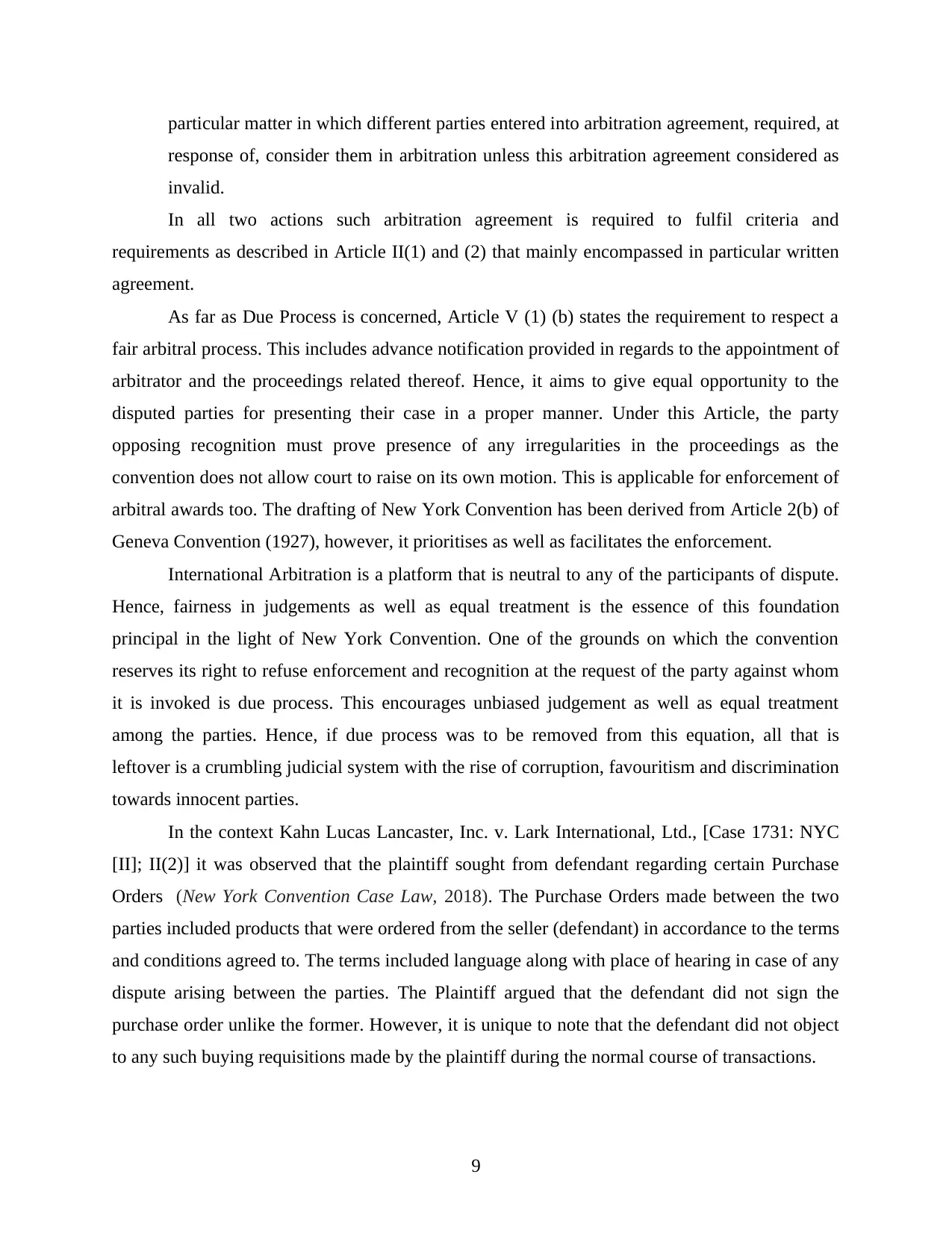
particular matter in which different parties entered into arbitration agreement, required, at
response of, consider them in arbitration unless this arbitration agreement considered as
invalid.
In all two actions such arbitration agreement is required to fulfil criteria and
requirements as described in Article II(1) and (2) that mainly encompassed in particular written
agreement.
As far as Due Process is concerned, Article V (1) (b) states the requirement to respect a
fair arbitral process. This includes advance notification provided in regards to the appointment of
arbitrator and the proceedings related thereof. Hence, it aims to give equal opportunity to the
disputed parties for presenting their case in a proper manner. Under this Article, the party
opposing recognition must prove presence of any irregularities in the proceedings as the
convention does not allow court to raise on its own motion. This is applicable for enforcement of
arbitral awards too. The drafting of New York Convention has been derived from Article 2(b) of
Geneva Convention (1927), however, it prioritises as well as facilitates the enforcement.
International Arbitration is a platform that is neutral to any of the participants of dispute.
Hence, fairness in judgements as well as equal treatment is the essence of this foundation
principal in the light of New York Convention. One of the grounds on which the convention
reserves its right to refuse enforcement and recognition at the request of the party against whom
it is invoked is due process. This encourages unbiased judgement as well as equal treatment
among the parties. Hence, if due process was to be removed from this equation, all that is
leftover is a crumbling judicial system with the rise of corruption, favouritism and discrimination
towards innocent parties.
In the context Kahn Lucas Lancaster, Inc. v. Lark International, Ltd., [Case 1731: NYC
[II]; II(2)] it was observed that the plaintiff sought from defendant regarding certain Purchase
Orders (New York Convention Case Law, 2018). The Purchase Orders made between the two
parties included products that were ordered from the seller (defendant) in accordance to the terms
and conditions agreed to. The terms included language along with place of hearing in case of any
dispute arising between the parties. The Plaintiff argued that the defendant did not sign the
purchase order unlike the former. However, it is unique to note that the defendant did not object
to any such buying requisitions made by the plaintiff during the normal course of transactions.
9
response of, consider them in arbitration unless this arbitration agreement considered as
invalid.
In all two actions such arbitration agreement is required to fulfil criteria and
requirements as described in Article II(1) and (2) that mainly encompassed in particular written
agreement.
As far as Due Process is concerned, Article V (1) (b) states the requirement to respect a
fair arbitral process. This includes advance notification provided in regards to the appointment of
arbitrator and the proceedings related thereof. Hence, it aims to give equal opportunity to the
disputed parties for presenting their case in a proper manner. Under this Article, the party
opposing recognition must prove presence of any irregularities in the proceedings as the
convention does not allow court to raise on its own motion. This is applicable for enforcement of
arbitral awards too. The drafting of New York Convention has been derived from Article 2(b) of
Geneva Convention (1927), however, it prioritises as well as facilitates the enforcement.
International Arbitration is a platform that is neutral to any of the participants of dispute.
Hence, fairness in judgements as well as equal treatment is the essence of this foundation
principal in the light of New York Convention. One of the grounds on which the convention
reserves its right to refuse enforcement and recognition at the request of the party against whom
it is invoked is due process. This encourages unbiased judgement as well as equal treatment
among the parties. Hence, if due process was to be removed from this equation, all that is
leftover is a crumbling judicial system with the rise of corruption, favouritism and discrimination
towards innocent parties.
In the context Kahn Lucas Lancaster, Inc. v. Lark International, Ltd., [Case 1731: NYC
[II]; II(2)] it was observed that the plaintiff sought from defendant regarding certain Purchase
Orders (New York Convention Case Law, 2018). The Purchase Orders made between the two
parties included products that were ordered from the seller (defendant) in accordance to the terms
and conditions agreed to. The terms included language along with place of hearing in case of any
dispute arising between the parties. The Plaintiff argued that the defendant did not sign the
purchase order unlike the former. However, it is unique to note that the defendant did not object
to any such buying requisitions made by the plaintiff during the normal course of transactions.
9
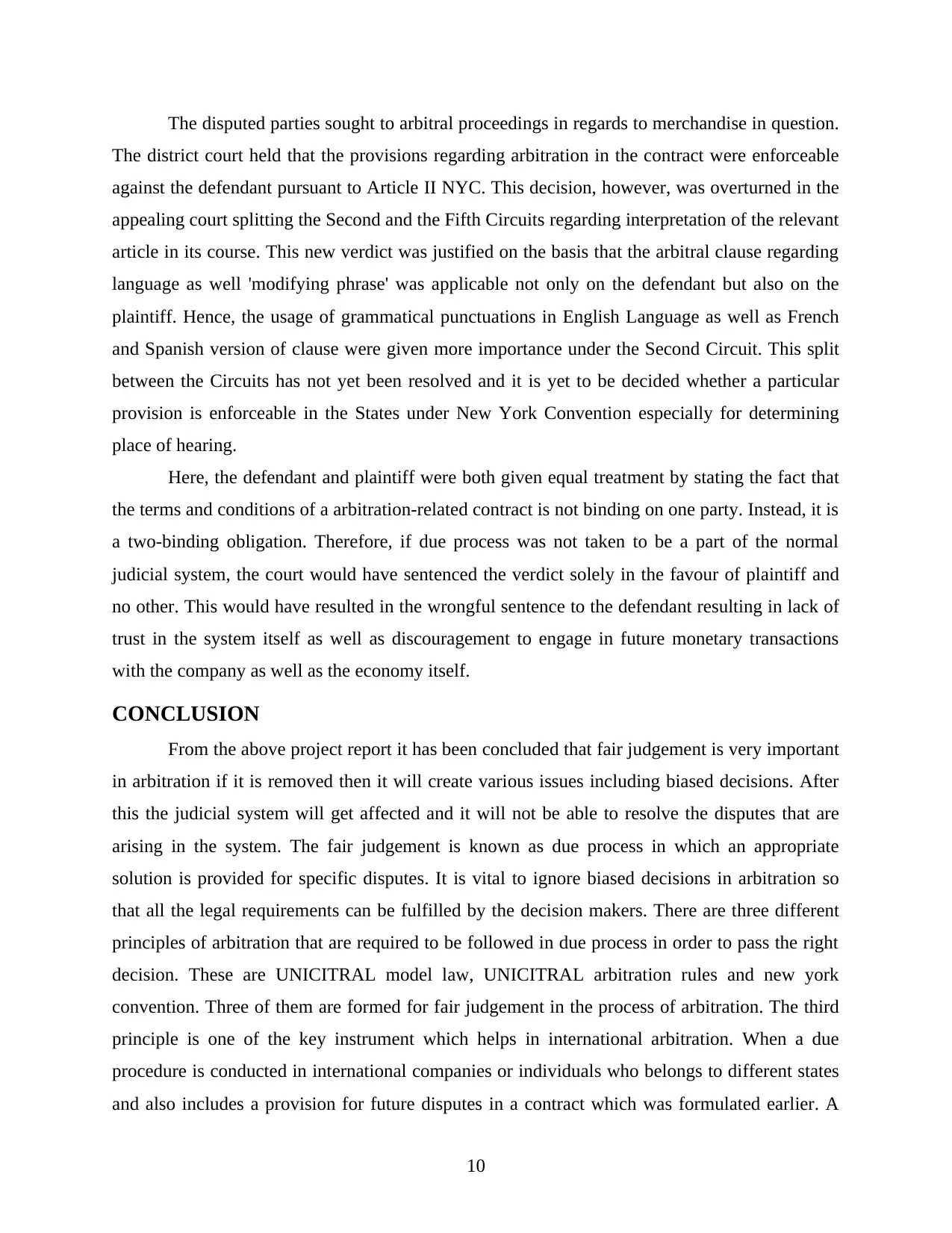
The disputed parties sought to arbitral proceedings in regards to merchandise in question.
The district court held that the provisions regarding arbitration in the contract were enforceable
against the defendant pursuant to Article II NYC. This decision, however, was overturned in the
appealing court splitting the Second and the Fifth Circuits regarding interpretation of the relevant
article in its course. This new verdict was justified on the basis that the arbitral clause regarding
language as well 'modifying phrase' was applicable not only on the defendant but also on the
plaintiff. Hence, the usage of grammatical punctuations in English Language as well as French
and Spanish version of clause were given more importance under the Second Circuit. This split
between the Circuits has not yet been resolved and it is yet to be decided whether a particular
provision is enforceable in the States under New York Convention especially for determining
place of hearing.
Here, the defendant and plaintiff were both given equal treatment by stating the fact that
the terms and conditions of a arbitration-related contract is not binding on one party. Instead, it is
a two-binding obligation. Therefore, if due process was not taken to be a part of the normal
judicial system, the court would have sentenced the verdict solely in the favour of plaintiff and
no other. This would have resulted in the wrongful sentence to the defendant resulting in lack of
trust in the system itself as well as discouragement to engage in future monetary transactions
with the company as well as the economy itself.
CONCLUSION
From the above project report it has been concluded that fair judgement is very important
in arbitration if it is removed then it will create various issues including biased decisions. After
this the judicial system will get affected and it will not be able to resolve the disputes that are
arising in the system. The fair judgement is known as due process in which an appropriate
solution is provided for specific disputes. It is vital to ignore biased decisions in arbitration so
that all the legal requirements can be fulfilled by the decision makers. There are three different
principles of arbitration that are required to be followed in due process in order to pass the right
decision. These are UNICITRAL model law, UNICITRAL arbitration rules and new york
convention. Three of them are formed for fair judgement in the process of arbitration. The third
principle is one of the key instrument which helps in international arbitration. When a due
procedure is conducted in international companies or individuals who belongs to different states
and also includes a provision for future disputes in a contract which was formulated earlier. A
10
The district court held that the provisions regarding arbitration in the contract were enforceable
against the defendant pursuant to Article II NYC. This decision, however, was overturned in the
appealing court splitting the Second and the Fifth Circuits regarding interpretation of the relevant
article in its course. This new verdict was justified on the basis that the arbitral clause regarding
language as well 'modifying phrase' was applicable not only on the defendant but also on the
plaintiff. Hence, the usage of grammatical punctuations in English Language as well as French
and Spanish version of clause were given more importance under the Second Circuit. This split
between the Circuits has not yet been resolved and it is yet to be decided whether a particular
provision is enforceable in the States under New York Convention especially for determining
place of hearing.
Here, the defendant and plaintiff were both given equal treatment by stating the fact that
the terms and conditions of a arbitration-related contract is not binding on one party. Instead, it is
a two-binding obligation. Therefore, if due process was not taken to be a part of the normal
judicial system, the court would have sentenced the verdict solely in the favour of plaintiff and
no other. This would have resulted in the wrongful sentence to the defendant resulting in lack of
trust in the system itself as well as discouragement to engage in future monetary transactions
with the company as well as the economy itself.
CONCLUSION
From the above project report it has been concluded that fair judgement is very important
in arbitration if it is removed then it will create various issues including biased decisions. After
this the judicial system will get affected and it will not be able to resolve the disputes that are
arising in the system. The fair judgement is known as due process in which an appropriate
solution is provided for specific disputes. It is vital to ignore biased decisions in arbitration so
that all the legal requirements can be fulfilled by the decision makers. There are three different
principles of arbitration that are required to be followed in due process in order to pass the right
decision. These are UNICITRAL model law, UNICITRAL arbitration rules and new york
convention. Three of them are formed for fair judgement in the process of arbitration. The third
principle is one of the key instrument which helps in international arbitration. When a due
procedure is conducted in international companies or individuals who belongs to different states
and also includes a provision for future disputes in a contract which was formulated earlier. A
10
⊘ This is a preview!⊘
Do you want full access?
Subscribe today to unlock all pages.

Trusted by 1+ million students worldwide
1 out of 14
Related Documents
Your All-in-One AI-Powered Toolkit for Academic Success.
+13062052269
info@desklib.com
Available 24*7 on WhatsApp / Email
![[object Object]](/_next/static/media/star-bottom.7253800d.svg)
Unlock your academic potential
Copyright © 2020–2026 A2Z Services. All Rights Reserved. Developed and managed by ZUCOL.





